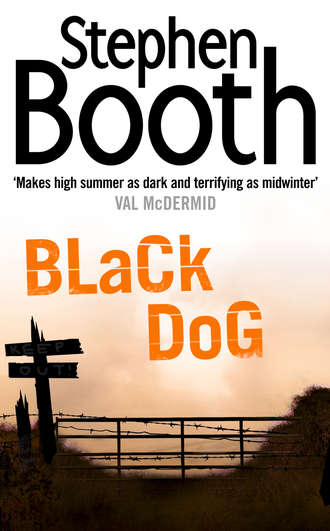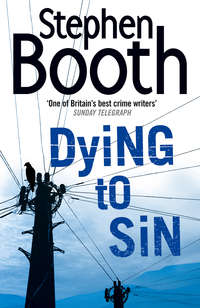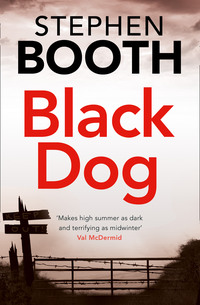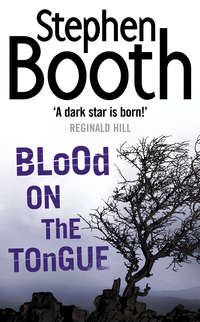
Полная версия
Black Dog
But all the calls were enquiries from friends. Some were even business calls, which Graham dealt with in a lowered voice, glancing towards his wife’s back as he turned guiltily away. He seemed relieved to have an excuse not to look at her as she posed against the view of the Witches, her head raised to the sky like a heroine in an Arthurian romance, waiting for news of a distant battle.
After the latest call, Graham replaced the phone and turned back towards the windows.
‘That was Edward Randle from AET,’ he said. ‘He sends his thoughts. And he wanted to know whether he and Martina should still come tomorrow night.’
Graham waited for Charlotte to speak. But he could only hear the faint buzzing of the fans and the distant bark of a dog somewhere down in the village.
‘I told him of course they should come. We can’t put people off, can we? Life goes on.’
Graham wondered whether she had heard what he said. She was in some world of her own where Allied Electronics and other such trivialities didn’t exist. Graham moved closer to her, wondering whether he should offer to touch her, whether it would be what she wanted just now, or whether it would only make things worse. He couldn’t tell.
When he stepped on to the terrace, he could smell the sun oil on her body. Her bleached hair hung straight on her neck, falling slightly on to the collar of her wrap. The backs of her slim, well-tanned legs were visible to the edge of her bikini, her muscles tense and stretched. Graham felt a surge of physical desire, but tried to suppress it. Maybe tonight his wife would be restored to her usual receptive mood. Maybe tomorrow.
‘Did you hear me, Charlie?’
‘I wish we could take the phone off the hook.’
‘But then we wouldn’t hear … if there was news.’
‘When they find her, you mean.’
Charlotte’s voice was tired now, the strain of the past forty-eight hours taking its toll, though she would be reluctant to admit it.
‘They will find her, won’t they, Graham?’
‘Of course they will.’
Graham repeated the same reassurance he had been giving for two days. He put as much sincerity as he could into his voice, though he doubted his wife really believed him. He certainly didn’t believe it himself.
The helicopter started to turn, its rotors dipping and fading from sight against the hillside behind it. Charlotte looked dejected at its disappearance, as if she had failed to decipher the message because she had not tried hard enough. From the terrace, none of the houses in the village were visible. The only human habitation in view consisted of a couple of farms high on the opposite slope, their weathered stone walls blending into the hillside as if they had grown there. No wonder Charlotte hadn’t wanted the helicopter to go away. It was the only sign of life she could see from the Mount.
‘You hear of girls running off and disappearing for ever,’ she said. ‘To London. Would she go to London, Graham? How would she get there?’
‘She’s only fifteen,’ he said. ‘They would bring her back.’
‘How would she get there?’ she repeated. ‘Where would she get the money? She could have hitched, I suppose. Would she know how to do that? Why didn’t she take any clothes?’
For two days she had asked too many questions that Graham couldn’t answer. He would have liked to tell her that he was sure Laura could have got no further than Bakewell, and that the police would pick her up before the night was over. He had tried to tell her, but the words dried up in his throat.
‘Don’t you want to come in now? It’s time to eat.’
‘Not just yet,’ she said.
‘It’s starting to go dark. You’ll want to change at least.’
‘I want to be out here,’ she said.
‘Charlie –’
‘As long as they’re still looking,’ she said. ‘I want to be out here.’
A book had been turned face down on to the table. Very little of it had been read, but it didn’t need to be. Graham could see from the cover that it was the latest in a best-selling series about an American pathologist who was for ever dissecting dead bodies and catching serial killers. The illustration showed a barely identifiable part of a naked body, set against a dark background.
‘I can’t think of anywhere else that she might have gone,’ said Charlotte. ‘I’ve been trying and trying, racking my brains. But we’ve tried everywhere, haven’t we, Graham? Can you think of anywhere else?’
‘We’ve tried them all,’ said Graham.
‘There’s that girl in Marple.’
‘We’ve tried there,’ said Graham. ‘Her parents said she was in France for the summer.’
‘Oh yes, I forgot.’
‘If she’s met up with the wrong sort of people …’
‘How could she?’ said Charlotte quickly. ‘We’ve been so careful. How could she meet the wrong people?’
‘We have to face it, it does happen. Some of her friends … Even if they’re from the best families, they can go astray.’
‘I suppose so.’
‘I’ve heard there are these rave things. Some of them go on all weekend, they say.’
Charlotte shuddered. ‘That means drugs, doesn’t it?’
‘We’ll have to talk to her about it seriously, when she’s back.’
After the helicopter had moved away to hover somewhere along the valley, the faint sound of voices could be heard, carried towards the house on the evening breeze. Graham and Charlotte could see no one because of the heavy tree cover, but both of them knew, without discussing it, that there were many men out there on the hillside, calling to each other, searching for their daughter.
‘Of course, there were probably friends she didn’t tell us about,’ said Graham. ‘We have to face up to that. Places she went that she didn’t want us to know about.’
Charlotte shook her head. ‘Laura didn’t keep secrets from me,’ she said. ‘From you, of course. But not from me.’
‘If you say so, Charlie.’
A small frown flickered across Charlotte’s face at his calm acceptance. ‘Is there something you know, Graham? Something that you’re not telling me?’
‘Of course not.’
He was thinking of his last conversation with Laura. It had been late on Thursday night, when she had slipped into his study and persuaded him to let her have a glass of his whisky. Her face had been flushed with some other excitement, even before the whisky had begun to take effect. She had perched on the edge of his desk and stroked his arm, smiling at him with that mature, seductive smile she had learned had such an effect on their male visitors. She had dyed her hair again, a deeper red than ever, almost violet, and her fingernails were painted a colour so dark it was practically black. Then she had talked to him, with that knowing look in her eyes and that sly wink, and told him what she wanted. The following morning, he had sacked Lee Sherratt. The second gardener they had lost that year.
‘No, of course not, Charlie.’
She accepted his word. ‘And the boy, Lee?’
Graham said nothing. He closed the abandoned novel, slipping a soft leather bookmark between the pages. He collected the book and the half-full glass of Bacardi from the table. The sun had almost gone from their part of the valley now. But the jagged shapes of the Witches were bathed in a dull red light that was streaked with black runnels where the rocky gulleys were in shadow.
‘What about him, Graham? What about the boy?’
He knew Charlotte still thought of Laura as pure and innocent. It was the way she would think of her daughter for ever. But Graham had begun to see her with different eyes. And the boy? The boy had already been punished. Punished for not dancing to the tune that Laura had played. Lee Sherratt had been too stubborn to play the game – but of course, he had been busy playing other games by then. And so Graham had sacked him. It was what Laura had wanted.
‘The police have spoken to him. He told them he hasn’t seen Laura for days.’
‘Do you believe that?’
He shrugged. ‘Who knows what to believe just now?’
‘I want to speak to him. I want to ask him myself. Make him tell the truth.’
‘I don’t think that would be a good idea, Charlie. Leave it to the police.’
‘They know about him, don’t they?’
‘Of course. They’ve got him on their records anyway. Over that stolen car.’
‘What?’
‘You remember. The car that was taken from the car park at the top of the cliff. It belonged to some German people. Laura told us about it.’
‘Did she?’ said Charlotte vaguely.
At last she allowed him to lead her back into the room, where she began to touch familiar objects – a cushion, the back of a chair cover, the piano stool, a series of gilt-framed photographs in a cabinet. She opened her handbag, touched up her lipstick and lit another cigarette.
‘Who else is supposed to be coming tomorrow night?’ she said.
‘The Wingates. Paddy and Frances. And they’re bringing some friends of theirs from Totley. Apparently, they’re building up a big computer business, installing systems in Doncaster and Rotherham. Paddy says they’ve got a really good future. They’d make an ideal account, but I need to get in quickly and make the contact.’
‘I’d better see to the food then.’
‘Good girl.’
As she turned towards Graham now, her eyes showed no sign of any tears. Graham was glad – she was not a woman given to tears, and he would not have known how to deal with it. Instead, she fiddled with the front of her wrap, letting him glimpse her brown thighs and the gentle slope of her belly above the edge of her bikini briefs.
‘You like Frances, don’t you?’ she said.
Graham grinned, recognizing the opening. ‘Not as much as I like you, Charlie.’
He took a step towards her, but she turned suddenly and picked up one of the photograph frames from the cabinet and began to stroke its edges.
‘Won’t you go and see the Sherratt boy, Graham? To help get Laura back.’
‘Leave it for now, Charlie.’
‘Why?’
‘Because the police will find her.’
‘Will they, Graham?’
The photograph frame she was holding was bare and empty. The picture had been given to the police to enable them to identify Laura when they found her. Graham took the frame from her and replaced it in the cabinet.
‘Of course they will,’ he said.
The old woman’s burst of anger was over, but her thin hands still jerked and spasmed on the floral-patterned arms of her chair. Helen watched her until she was calm, and pulled her cardigan closer round her shoulders from where it had slipped.
‘I’ll put the kettle on, Grandma.’
‘If you like.’
‘Do you want your Special Blend?’
‘The bags’ll do. But make sure you put an extra one in the pot. You know how I like it.’
Helen stood at the narrow window of the kitchen of Dial Cottage while she waited for the kettle to boil. The electrical appliances that her father had bought for his parents-in-law left hardly any room in the kitchen to turn round. There was certainly not enough space for two people between the cooker and the oversized pine table crammed in lengthwise to the sink.
The table was scattered with cooking equipment, place mats with scenes of a North Wales seaside resort, sprigs of mint and thyme tied with bits of string, a jar of marmalade, a jar filled with wooden ladles and spatulas, a potato peeler with a wooden handle, a chopping board and half an onion soaking in a bowl of water. By the back door a pair of wellington boots and a walking stick stood on the blue lino, and a dark-green waxed coat with a corduroy collar hung from the hook where Harry’s cap would normally have been. The coat had been Helen’s present to him on his seventy-fifth birthday.
‘He was never like this before,’ said her grandmother from her chair, not needing to raise her voice over the short distance to the kitchen. ‘Never this bad. Now he can’t speak without biting my head off.’
‘Have you asked him what’s wrong?’
‘Asked him? Him? I might as well talk to the wall.’
‘Perhaps he’s ill, Grandma.’
‘He had a cold the other week, I suppose.’
Helen could see that her grandmother thought that Harry was just being a bad-tempered old man, that she had done something to annoy him. But Helen’s thoughts were running on some serious illness troubling him, something he was keeping to himself, an awful secret he wouldn’t want to inflict on his wife and family.
There were so many possibilities when you were in your late seventies, when you smoked, when you had spent most of your working life in a lead mine, when you had fought your way through a vicious war. Her grandmother, Gwen, would not think of these things. She would believe that Harry had a bad cold right up to the moment they put him in the ground at St Edwin’s.
‘But if he’s ill it doesn’t stop him going off down there with Jess. It doesn’t stop him going off with those friends of his, either.’
‘No, Grandma.’
Helen put hot water into the teapot and emptied it out again, dropped three tea bags in and poured on the boiling water from the electric kettle.
While she waited for the tea to brew, she looked out of the window, across the back garden towards the valley. The garden itself was bright with beds of petunias and violets, rows of potato plants with white and yellow flowers, and canes wrapped round with runner beans. But beyond the garden, the woods that ran down the valley looked dark and brooding. Helen could see the police helicopter hovering over the tops of the trees half a mile away. They were still looking. Still hoping.
‘They’ve changed him. He thinks more of his cronies than he does of me. More than he does of his family.’
‘Granddad thinks the world of his family.’
‘They’ve changed him. That Wilford Cutts and the other one, Sam Beeley.’
‘Them? They’re just Granddad’s friends. His old workmates. They’re nothing to do with it.’
‘It’s them that’s done it.’
‘I’m sure they haven’t done anything, Grandma. They’re just his friends from Glory Stone Mine. He’s known them for years.’
‘Not like now. It was different before, when they were working. But now they’ve led him away, filled his head with thoughts.’
‘I don’t know what you mean,’ said Helen.
But she had wondered herself, sometimes, about what the three old men got up to when they were together out on the hill, or up on Wilford’s untidy smallholding with the flock of hens and the odd little collection of ageing animals. Sometimes Harry brought home a capful of speckled brown eggs from the Cuckoo Marans or a bag of potatoes from the disused paddock that he and Wilford had converted into a huge vegetable patch. At other times, the three of them just went to the pub, where Sam Beeley came into his own and bought the drinks.
‘Since he’s had no work, he’s been different,’ said Gwen. ‘All of them have. It doesn’t do for men to be at a loose end. Not men like them. The devil makes evil work.’
‘You’re talking nonsense now, Grandma.’
Helen found a carton of long-life milk in the fridge and dropped a tiny amount into a cup. Then she poured the tea, making sure it was good and strong.
Her grandmother had kept her old lino on the floor in the kitchen. She had protested so much when they had laid the new fitted carpet in the sitting room that her son-in-law, Andrew, had been forced to give in on this one point. She had said it was easy to keep clean. For Helen, looking at the blue lino now, it also seemed to be inseparable from the dark oak panelling and the bumpy walls and the whitewashed stone lintels over the doors.
‘He thinks more of them than me, anyway. That’s what I say. He’s proved it now.’
‘Let’s forget about it for a bit, Grandma. Enjoy your tea.’
‘You’re a good girl. You were always his favourite, Helen. Why don’t you talk to him?’
‘I will try,’ promised Helen.
She stood by the old woman’s armchair, looking down on her white hair, so thin she could clearly see the pink scalp. She wanted to put her arm round her grandmother’s shoulders and hug her, to tell her it would be all right. But she knew that Gwen would be embarrassed, and in any case she wasn’t at all sure that it would be all right. A sudden surge of affection and frustration made her turn away.
Then she saw her grandfather, a small figure way down at the bottom of the hillside path, just emerging from the trees at the foot of Raven’s Side. Whether it was something about the way he moved or the set of his shoulders, she couldn’t say. But she knew immediately that there was something badly wrong.
Gwen cocked her head and peered at Helen, sensing the tension in her silence.
‘What is it, dear?’
‘Nothing, Grandma.’
Helen unlatched the back door and stood on the whitewashed step. Suddenly she felt an irrational flood of memories streaming out of the old cottage behind her like coils of smoke escaping from a burning house. They were childhood memories, mostly of her grandfather – memories of him taking her by the hand as they walked on this same path to look at the fish jumping in the stream, or to pick daisies for a daisy chain; of her grandfather proudly sitting her on his knee as he showed her how he filled his pipe with tobacco and lit it with the long coloured-paper tapers. Fleeting smells flickered by her senses, passing in a second, yet each one with enough emotional power to fill her eyes with instant tears. They were the remembered smells of pipe smoke and Brylcreem and boot polish.
Harry had always seemed to be polishing his shoes. He still did. It was one of those signs that she knew her grandfather by even as he had changed over the years. Without those signs, she thought, old age might have made him unrecognizable to the child who had known the strong, indestructible man in his fifties.
It was in just the same way that, at this moment, she knew her grandfather only by his walk. It was a slow, purposeful walk, upright and solemn, the pace of a soldier at a funeral, bearing the coffin of a dead comrade.
She heard the helicopter turn again and come straight towards her. Two faces stared down at her, expressionless behind their dark glasses. She felt as though the watching policemen could see straight into her heart. Their presence was somehow personal and intimate, and yet for ever too far away.
3
‘OK, take a break.’
The word came down the line from the uniformed sergeant at the opposite end from Ben Cooper. The men in blue overalls and wellingtons backed away from the line of search and sat on the tussocks of rough grass in a half-circle. Someone produced a flask of tea, someone else a bottle of orange juice.
PC Garnett settled down comfortably, tossing his pole aside, taking off his cap to reveal receding hair cropped short at the sides. They said it was the helmets that made so many policemen start to lose their hair early. Cooper himself was conscious that one day he would start to see a thinning on either side of his forehead. Everybody told him that his fine brown hair was just like his father’s, who had never been anything but halfway bald, as far as he could remember. So far, though, he was still able to let a lock of hair fall across his forehead as he had always done. Fashions had tended to pass him by.
Garnett smiled as he mopped his brow with his sleeve and eased himself into gossip mode. ‘So what about this new recruit in your department, Cooper? The new DC?’
‘I’ve not met him yet. I’ve only just come back from leave.’
‘It’s a “her”, mate, a “her”. Diane Fry, they call her.’
‘Right.’
‘She’s from Birmingham.’
‘I’ve not heard anything about her. I expect she’ll be all right.’
‘According to Dave Rennie, she’s a bit of a hard-faced cow. Could be a looker, he says, but she doesn’t bother. Blonde, but has her hair cut short. Too tall, too skinny, no make-up, always wears trousers. A bit of a stroppy bitch.’
‘You haven’t even met her,’ protested Cooper.
‘Well, you know the type. Probably another lesbian.’
Cooper blew out an exasperated breath. ‘That’s ridiculous. You can’t go around saying things like that. You don’t know anything about her.’
Garnett had the sense to hear the irritation in Cooper’s voice and didn’t argue. He idly pulled a clump of dandelions and shredded the leaves between his fingers. But Cooper couldn’t let the subject rest.
‘You know what it’s like for the women as well as I do, Garnett – some of them just try too hard. She’ll fit in fine after a week or two, you’ll see. They usually do.’
‘I dunno about that. I’ve a feeling you’ll not have time to be her best mate, though, lad. She’ll be up and away in no time.’
‘Why? Does she go ballooning?’
‘Ha, ha.’ Garnett ignored the sarcasm, in fact was probably impervious to it when he had a good subject of gossip. ‘She comes with a bit of a “rep” actually. A potential high-flier, they reckon. Ambitious.’
‘Oh yeah? She’ll have to prove herself first.’
‘Maybe.’
The clouds of tiny flies were getting thicker as they gathered around the men’s heads, attracted by their sweat and the sweet smell of the orange juice. The PC looked smug.
‘Come on, what do you mean?’ said Cooper. ‘You don’t just get promotion without showing you’re worth it.’
‘Get real, mate. She’s female. You know – two tits and a fanny, always puts the toilet seat down.’
‘Yeah, I’ve noticed that. So what?’
‘So what? So what? So the force is short of female officers in supervisory ranks, especially in CID. Don’t you read the reports? You just watch, old son – provided she keeps her nose clean and always smiles nicely at the top brass, Detective Constable Fry will shoot up that promotion ladder like she’s got a rocket up her arse.’
Cooper was about to protest when the shout went up from the contact man. ‘DC Cooper! Is DC Cooper here? Your boss wants you. Urgent.’
The instructions from DI Hitchens were terse, and the address he gave Cooper was in Moorhay, the village visible on the brow of the hill above the woods. Communities in this area tended to gather around the thousand-foot contour, the valley bottoms being too narrow.
‘Check it out, Cooper, and fast. We either get to the girl in the next two hours or we lose the whole night. You know what that could mean.’
‘I’m on my way, sir.’
‘Take somebody with you. Who’ve you got?’
Cooper looked back at the group of men lounging on the grass. His gaze passed across PC Garnett and a couple of other middle-aged bobbies, the overweight sergeant, two female PCs from Matlock and the three rangers.
‘No CID officers, sir. I’ll have to borrow a uniformed PC.’
There was a suggestion of a sigh at the other end of the line.
‘Do it then. But get a move on.’
Cooper explained as quickly as he could to the sergeant and was given a tall, muscular young bobby of about twenty called Wragg, who perked up at the prospect of some action.
‘Follow me as best you can.’
‘Don’t worry, I’m right with you,’ said Wragg, flexing the muscles in his shoulders.
The path up to Moorhay wound back through the trees to where a kissing gate gave access through the dry-stone walls into a field where black and white dairy cattle had recently been turned back in after milking. The field had been cut for hay a few weeks before, and the grass was short and springy underfoot as Ben Cooper ran along the side of the wall, the heat and sweat prickling on his brow and his legs spasming with pain as he forced them on. Wragg kept pace with him easily, but soon dropped his tendency to ask questions when Cooper didn’t respond. He needed all his breath for running.
The cows turned their heads to watch them pass in astonishment, their jaws working slowly, their eyes growing huge between twitching ears. Earlier in the afternoon, the search party had had to wait for the farmer to move the cows to the milking shed before the line could work its way across the field. The air had been filled with crude jokes about cow pats.







